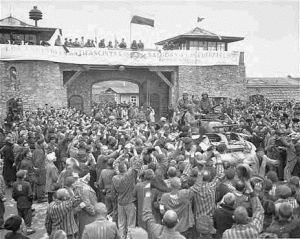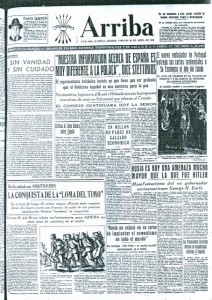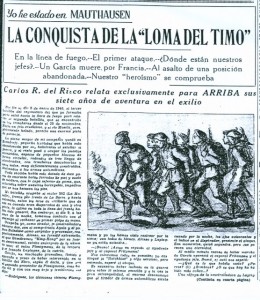Mauthausen: A Spaniard’s tale
(Editor’s note: A longer version of this piece will be published next year in the journal History & Memory.)

Mauthausen survivors cheer the soldiers of the Eleventh Armored Division of the U.S. Third Army one day after their actual liberation. Photo Donald R. Ornitz. USHMM, courtesy of National Archives and Records Administration, College Park.
A Spaniard named Carlos Rodríguez del Risco was imprisoned in the Nazi concentration camp of Mauthausen from 1940 to 1945. Although he was sympathetic to the Spanish Republic when he went into exile at the end of the Spanish Civil War, he became hostile to the Republican cause during his deportation and imprisonment. He subsequently renounced what he considered to be his disloyal defense of the Republic in favor of a newly found devotion to dictator Francisco Franco and the Nationalist cause, declaring, “Catholic by conviction, I am a soldier of the Church; fervent Spaniard, I will always be a loyal servant of my Country. And my Country is now, whether or not the communists and renegades like it, unanimously represented by Franco, a man providentially chosen to liberate it from the most tremendous loss of life of all time.”
In 1946, one year after he was liberated from Mauthausen, Rodríguez del Risco published an account of his five-year exile in the Franco regime’s officially sanctioned fascist newspaper, Arriba. During a period when information about Nazi concentration camps and World War II was largely censored in Spanish newspapers, the author’s story, “Yo he estado en Mauthausen” (“I Was in Mauthausen”), was the first published account of a Nazi concentration camp by a Spanish survivor. Although Rodríguez del Risco’s memoir presents verifiable historical information about the Holocaust and the experiences of Spaniards in a Nazi camp, it is also propaganda for Franco, containing offensive rhetoric about Jews and Spanish Republicans. These contradictions and the fact that the author is the first Spanish voice from the Holocaust make Rodríguez del Risco’s story appalling and fascinating at the same time.
Rodríguez del Risco was one of thousands of Spaniards caught in Nazi concentration camps after fleeing Spain at the end of the Spanish Civil War. First held in flea-infested, barbed-wire enclosures along the coast of France, many defeated Spanish Republicans were forced into the French Companies of Foreign Workers or Foreign Legion in order to escape their miserable conditions. Like many of his exiled compatriots, when World War II erupted, Rodríguez del Risco was taken by the Germans and sent to a prisoner-of-war camp. Although Spain was officially neutral in World War II, Franco was complicit with Hitler’s Germany. The dictator disowned the exiled Republicans, leaving them at the mercy of the Nazis, and they were deported to concentration camps across the Third Reich. Rodríguez del Risco and over 7,000 other Spaniards were sent to the Mauthausen extermination camp in Austria, where 5,000 of them died. None were Jewish.
As a political prisoner, Rodríguez del Risco was not a target for the Nazi’s Final Solution, unlike Mauthausen’s Jewish population, which was subject to extermination in the gas chambers. Although he writes about meager rations, inhumane working conditions, and beatings he received for offenses as minor as smoking a cigarette, Rodríguez del Risco survived his ordeal in Mauthausen, unlike the majority of the Spaniards, who died from starvation, lethal injection, physical exhaustion, or the brutality of the S.S. When Mauthausen was liberated by American forces on May 5, 1945, some 2,000 Spaniards were still alive, although many of them died in the days after liberation from dysentery and starvation-related causes. Unlike Rodríguez del Risco, who returned to Spain as a Franco supporter in 1945, most Spanish survivors returned to France after the war, fearing they would be killed or imprisoned in Spain for their fervent anti-Franco politics. With few exceptions, the stories of the Spanish survivors of Mauthausen would remain untold in Spain until after Franco’s death in 1975.
Rodríguez del Risco’s testimonial narrative is one of the few exceptions. Between April 26 and June 1, 1946, the 28 installments of his story, each one subtitled “Carlos R. del Risco relates exclusively for ARRIBA his seven years of adventure in exile,” were splashed across the pages of Arriba, a newspaper that acted as the Franco regime’s mouthpiece. Although the author’s story mimics a classic adventure tale, a conversion narrative, and a 19th-century serialized Spanish novel, it is not a work of fiction, but sprang from the true-life nightmare Rodríguez del Risco survived.
In the articles, Rodríguez del Risco recounts beatings and deprivations that he and other Spanish prisoners suffered in the camps at the hands of the S.S. and fellow prisoners-commanders or kapos. He observed the high-ranking Nazi officer Heinrich Himmler’s inspection of Mauthausen, and he identifies individual S.S. and kapos who were particularly cruel or who provided aid to the prisoners. In 1940, he witnessed the arrival of a train convoy from Angoulême, France, of entire Spanish families, writing that “they arrived at the Mauthausen camp on the 16th of [August]. Astonishment, anger and terror gained control of all of them, but all of the protests that they formulated ended up being useless. They made the men and boys over 10 years of age get off the train, and despite the desperation of the women, mothers, sisters and wives who stayed on the train, they were imprisoned in Mauthausen.” This and other detailed historical information provided in the pages of Arriba demonstrates the power of one eyewitness account of the Holocaust.
Yet in the same pages, Rodríguez del Risco includes anti-Semitic diatribes, misinformation about Spanish Republicans, glowing words about Franco, and the absurd argument that Hitler, whom he calls a “true patriot,” had no knowledge of the Nazi’s systematic extermination of the Jews. The articles served as propaganda for the anti-Semitic and anti-Republican Franco dictatorship, bordering on a denial of the Holocaust.
Although some might discount “I Was in Mauthausen” as political spin for Franco, the author’s story nevertheless provides us with accurate and personal information about a moment in history that is still relatively unknown in Spain and almost completely unknown outside the country. We must consider Rodríguez del Risco’s words in the cultural and political climate of Spain in 1946 to understand the text’s violation of its responsibility as the first Holocaust narrative to emerge from the country. Ultimately, “Yo he estado en Mauthausen” is only the controversial starting point for the many Holocaust representations yet to come in Spain throughout the Twentieth and Twenty-First Centuries.
Sara J. Brenneis teaches in the Spanish Department at Amherst College.















All of the articles in the current issue of “The Volunteer” are very interesting as is this article by Ms. Brennels. But I feel that I should comment on two items that got my special attention. One being “Rodriguez del Risco was one of thousands of Spaniards caught in Nazi concentration camps after fleeing Spain at the end of the Spanish Civil War.” The Spaniards were not caught in Nazi concentration camps but in French concentration camps just across the Spanish-French frontier in late January to early February 1939. The second world war didn’t start till Sept. 1939. The French concentration camps were horrendous. Hundreds of refugees died of exposure, pneumonia, malnutrition and brutal treatment by the Senegalese guards.
The other item, or statement rather, is “Although Spain was officially neutral in World War II, ……” Franco declared Spain as “non-belligerent” at the beginning of WWII, and that has a very different meaning from “neutral”. That means that Spain would not be involved in the warfare, but it was certainly not neutral. Franco supplied Nazi Germany with all kinds of raw materials such as wolfram (tungsten), copper, coal, not to mention food supplies, and also refueling for Nazi submarines in small fishing ports, away from the main Spanish ports. And provided observation bases near Gibraltar, from which allied shipping could be observed entering the Mediterranean, and the information being sent to German and Italian submarines, and airbases. Also German military and SS had R&R locations in Spain.
Franco sent 45,000 “volunteers”, the “Blue Division” to Germany where they were trained and outfitted with German uniforms and equipped with German weapons, at the training center Grafenwehr. After several months they were sent to the Eastern front where they saw action alongside the Nazis against the Red Army.
A book was published with the title “Hitler’s Spanish Legion: The Blue Division on the Soviet Front”. Not quite sure about the complete title, and possibly it was “…..: Franco’s Blue Division”.
The division suffered terrible casualties on the front, many deserted to the Soviets, others were taken prisoner, but the remnants were repatriated to Spain sometime after the tide began to turn against the Nazis, and at which point Franco declared Spain to be “neutral” (no longer non-belligerent).
I met a few Catalan survivors of Mauthausen in Barcelona during the 1990’s when they organized an exhibition of photographs, and also of the striped concentration camp prisoner “uniforms”.
The Spanish prisoners that were singled out for the most brutal treatment were the communists, socialists and anarchists. Few of them survived.
Best wishes. Alex Gabriles, Houston, TX
I appreciate Mr. Gabriles’ response to my article. Although it is true that Spaniards were first interned in French camps, by 1940 they were entering Nazi camps, and this is the moment when Rodríguez del Risco’s narrative begins. Thousands of Spaniards eventually died in Mauthausen, and hundreds in other camps (Büchenwald, Ravensbruck, etc) as well.
Franco’s non-belligerence stance only became clear after the fact, as Mr. Gabriles details in his letter. At the time of Rodríguez del Risco’s publication in 1946, Franco was promoting neutrality in World War II as Spain’s official position, certainly as a means of distancing himself from Hitler and ingratiating himself to the Allies. This atmosphere of duplicity is reflected in the contradictory nature of Rodríguez del Risco’s articles, which are also propagandistic. I am able to go into more detail on these issues in my forthcoming History & Memory article.
— Sara J. Brenneis
Dear Ms Brenneis:
My name is Leonor Rancano,my maiden name is Leonor Del Risco I dont have a very common last name and I’m curious if this gentlemen Rodriguez Del Risco was related to my father his name was Francisco Del Risco born in Cuba, Camaqüey, son of Miguel Del Risco and Leonor Del Risco Mateumy grandfather fought in the Cuban civil war that’s all the information I have .I will be forever grateful for any information you might have.
Sincerly
Mrs : Rancaño
Dear Mrs. Rancaño,
Although I do not know the particulars of Rodríguez del Risco’s lineage, I have not come across any information that indicates he was of Cuban decent. Please feel free to email me so I can follow up should I uncover any further details that may be of interest.
All best,
Sara Brenneis
[…] Spanish Republicans who had fought against Franco were sent to concentration camps in Spain, Germany, and Austria. Franco then stripped the political autonomy of Catalonia. The Catalonian people gained political […]
After reading this article, I should very much like to read ‘Yo he estado en Mauthausen’. Is it available online?
Thank you.
In the portion of Rodríguez del Risco’s account where he mentions the train full of Spanish families arriving to Mauthausen on the 16th of August, is there any knowledge as to where the women and children (including boys under 10) were taken? Is there a well-known camp where female Spaniards were taken?
Many Thanks!
Christina
[…] Spanish Republicans who had fought against Franco were sent to concentration camps in Spain, Germany, and Austria. Franco then stripped the political autonomy of Catalonia. The Catalonian people gained political […]
Just seen the movie .very upsetting would like to know more.